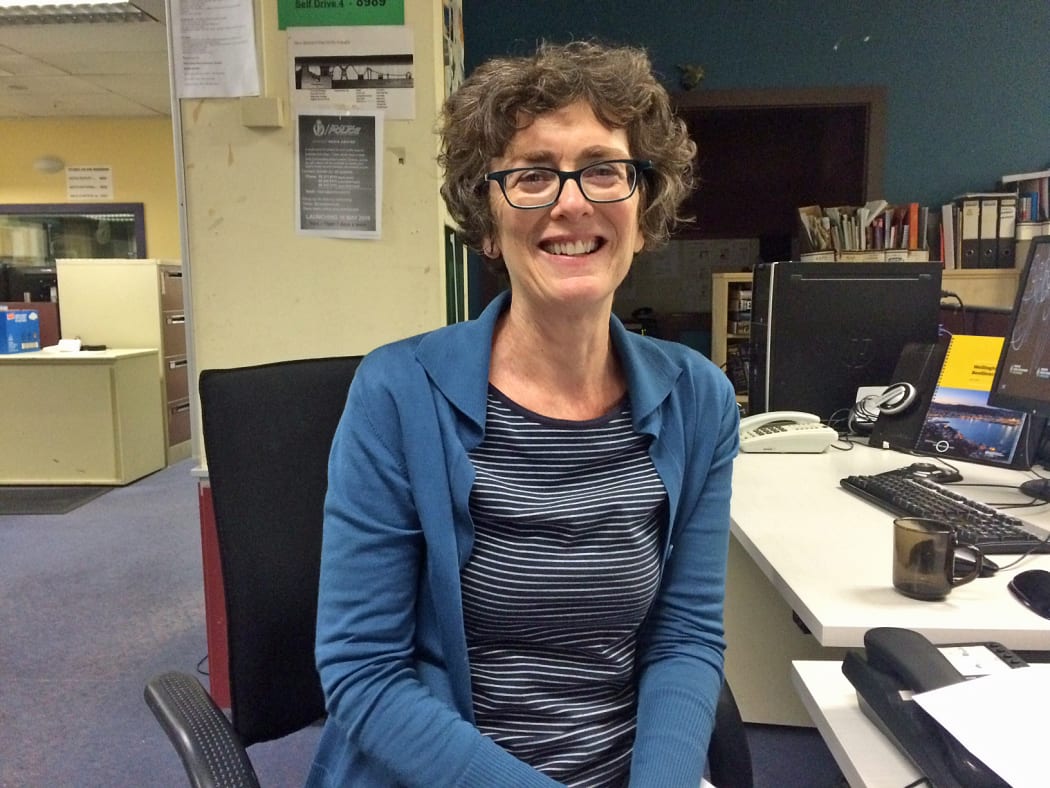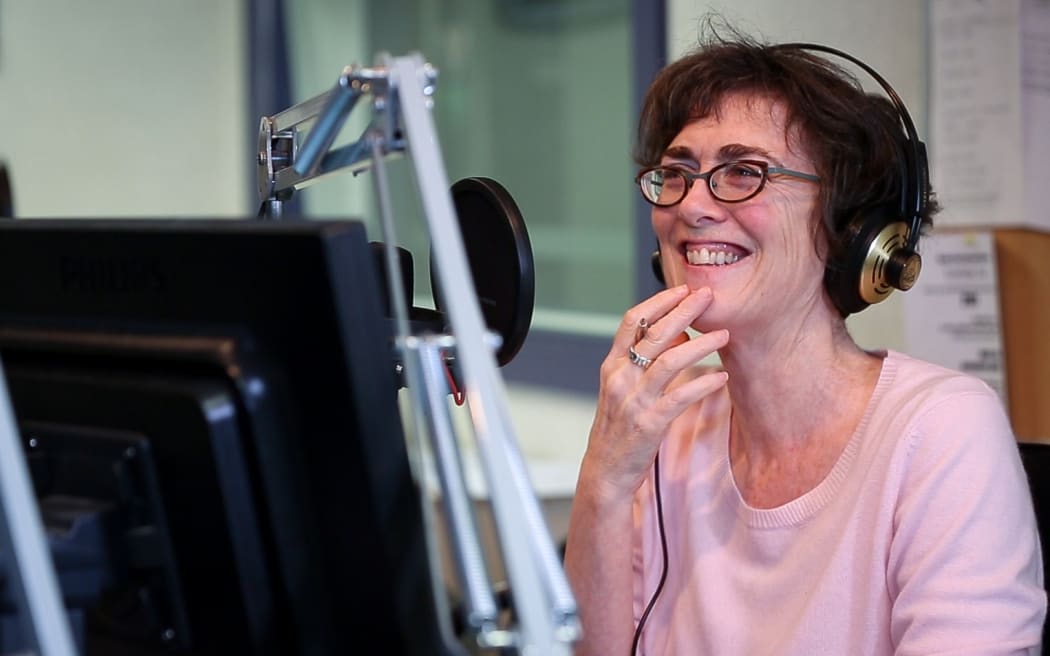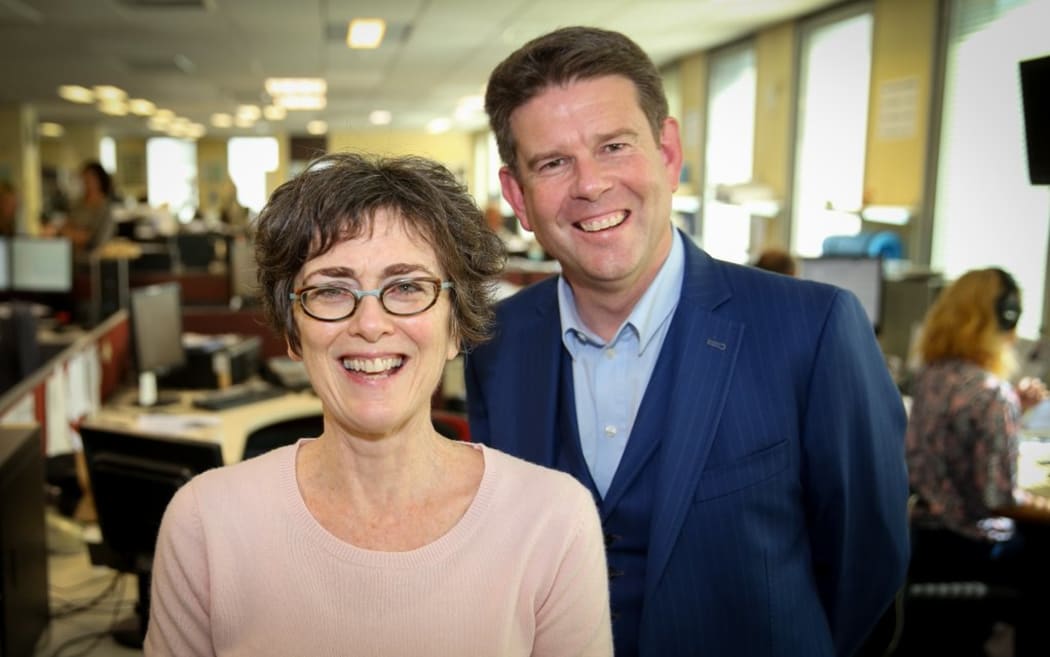Not all journalists like having the mic turned in their direction. But then, Mary Wilson is not your average journalist.

Mary Wilson at the helm in the Wellington newsroom. Photo: RNZ / Paul McIntyre
She spent nearly 20 years at the helm of Checkpoint, New Zealand's longest running news and current affairs programme.
That's more than 4000 programmes and even more hours of live radio: listening intently, asking the pointed questions and holding the country's politicians and newsmakers to account.
She approaches this interview with the same energy and consideration - not to mention good humour, as is evident from the number of times I write "(laughs)" within this transcript.
Mary Wilson started presenting full time in 1997 when the show was revamped as a fast-paced, daily news format but with fewer staff to handle the work load...
Mary: It was frantic (laughs). We just went flat out from the time we started to 6pm and we continued like that I cannot remember for how long until we both decided it might kill us. And at that point they gave us an intern, which was a huge help, but which meant that we didn't actually, as is obvious now, collapse and die.
Katy: Can you relate those really busy days to any particularly stories where you were racing around and trying to deliver what the audience needed in the face of so few staff?
Mary: I guess the thing we would do is try to get the person who was closest to the story on. The job was simple in the sense of the story broke or you got a horrible, great 300-page report and you knew you had to talk to someone about that. So you had a very short space of time to distil that and prioritise and decide what your one or two questions would be.
I remember one time, the phone's ringing and Don (Rood - the programme's editor) and I just looking at each other and thinking, "Well, can't answer it because we actually don't have time now. We're so busy just processing and getting the stuff together that we need to be on air that we can't answer the phone." So you just got on really.
They always needed a few pre-recorded interviews as a backup.
Mary: Sometimes the people that you'd set up live didn't show up...
Katy: How inconsiderate!
Mary: It was! So you could get Don saying, "Wind it up now" because he was expecting the person to be on the phone and he was dialling through and then they weren't there so, "No, keep going!", "No, end now!" (laughs) "Ask another question."
Katy: Did you ever have a moment where you thought, "I don't know what else I'm going to ask this person?"
Mary: No, well you kind of think, "What am I going to ask now?", but something always happened (laughs). I mean, in the moment you do ask another question, you cannot say, "I don't know what to ask you anymore" (laughs).
You've got to keep going and, in the end, I guess the saving grace is that, although a minute can feel like an hour, it was a short programme and generally things didn't go on for more than three minutes. You can always pull something out to get you through that next 30 seconds or 90 seconds until the pips start and you're out.
It was pressure. You either do it or you don't and I discovered I could, otherwise my career as a presenter might have been quite short lived (laughs).
Katy: Indeed. Tell me, I imagine when you're in that moment everything else just shrinks away and it is only you and the person you are speaking to.
Mary: Yes, exactly. You don't think about the audience if you're engaged in the conversation or listening to the person. You forget everything else. It's just that interaction between you and with the person, either sitting in the seat across from you or on the phone line. It's quite an intimate experience in a way.
Katy: So you obviously have a reputation as a pretty formidable interviewer but have you had some interviews that you were a little bit scared of?
Mary: Well I used to be a little scared of interviewing Winston Peters, I guess, until I realised that if you know your subject and you've done your homework and you've got your details right, there's nothing to be afraid of at all because he's not great on detail actually. So, when you ask a question and want more information, often he can't give it to you and you can come back with your information and it becomes quite a different kind of interaction.
Katy: So did you feel yourself growing over time in that way as an interviewer? Did you personally clock those moments and think, "Actually I've reached a point where I'm better than I was"?
Mary: Definitely. I always worried about doing a good job and, in a way, you kind of felt that the last thing you did was as good as you could be and if you did a bad job that detracted from everything else you might have done. But obviously you do get used to things happening. The whole beast of live radio is something you adjust to and all the myriad of different things, the nightmares that can happen live on air, you build up the experience and you become more comfortable.
Katy: So tell me about some of those disasters or things that didn't go to plan?
Mary: Well, one time we had someone on who wasn't the right person. He was just a member of the public who'd been rung and answered. (laughs) We thought he was this person, or the producer did, and he answered to the name, in fact. But, once he got on the air, it was quite clear within several seconds that we were talking to some random person so (laughs) had to wrap that one up quite quickly.

Mary Wilson started presenting full time in 1997 when the show was revamped as a fast-paced, daily news format. Photo: RNZ / Alexander Robertson
That's another lesson she learnt about live interviewing: when to finish quickly.
Mary: When you're finished, you're finished. Don't keep trying to get something out of a subject when it's clear that it's not going anywhere. Knowing when to end is always a good thing and can save you a whole lot of misery.
She recalls another occasion when a live interview fell over and a news reporter went the extra mile.
Mary: Eventually we dialled the fourth person on the list who was a reporter - I won't name him - who happened to be in the toilet, mid-stream when we crossed to him. So there you go (laughs). He did a very good job (laughs).
Katy: Can you look back and think of an interview where you felt particularly pleased with yourself, or you felt like this was going to be a tricky one [but] extracted more than you thought you would ?
Mary: I think interviewing bureaucrats, that's been a big thing, penetrating their dreadful jargon and getting to the nub of the story. I remember one interview I did with a Ministry of Health bureaucrat about audits on rest homes. We'd had a few stories about some pretty ghastly things going on in rest homes. [I remember] this person talking in this kind of impenetrable language and eventually extracting the information that the audit was a complete paper exercise. These people had never actually been to the rest home and if they were to go they would ring the rest home up first and tell them they were coming.
So those sorts of interviews were exhausting in a way and you could think, "Well, you know I'll just let them answer and then finish but you had to hang in there. To extract the information and get clarity was, I felt, a really great achievement and I felt really proud of those [interviews].
Katy: You mentioned Winston Peters as someone you might have approached with trepidation early on. Are you aware of how others viewed you and doing an interview with you ?
Mary: Oh yes, sometimes the producers would say, "They've asked if you're doing the interview and they would say, "Could she be nice?" (laughs) So I was aware of that view. But then, at times people who got upset often weren't the sort of interviews I did with ordinary people about their experiences. They were people in positions of power.
If a high ranking police officer, for example, was going to be upset because I was asking him direct questions and probing for some more information then that didn't worry me at all. I felt that that's what they were there to do: to answer questions and they were big enough and brave enough and well paid enough to be able to be in that position and answer those questions.
I didn't feel bad about that at all. In fact, I felt that was my job.

Checkpoint meets Checkpoint: Mary Wilson and John Campbell. Photo: RNZ / Alexander Robertson
She believes some of the criticism was an over-reaction and the reputation that attracted the title "Scary Mary", somewhat exaggerated.
Mary: Oh, Scary Mary - I don't know, I mean I always made sure that the people who were telling their story who were ordinary people, I was never like that to them, never asking them questions in terms of holding people to account. I think that in some ways the reputation was exaggerated and people kind of built on things. It's the media you know ... (laughs). Always exaggerating!
Then there was the time she says she was almost accused of committing treason…
Mary: I questioned one of the people who was in charge of the America's Cup - this was back in the day. There was a whole bunch of them after the win. They were flying around the country in an Air New Zealand plane, which we were going to be paying for in terms of the taxpayers, and I asked a few questions about why that should be. The man got, not upset with me on air, but answered the questions and then, shortly after the interview, rang back into the studio to accuse me of being kind of like the equivalent of un-New Zealand and not very patriotic.
Katy: So how did you take this slur upon your patriotism?
Mary: I think I laughed (laughs again).
At the end of 2015 Mary Wilson was appointed the Director of News Programming, but still looks back fondly on her Checkpoint role as "a great gig".
Mary: I'm glad to have been a part of it. It's a little bit of history. A little bit of radio history (laughs).

